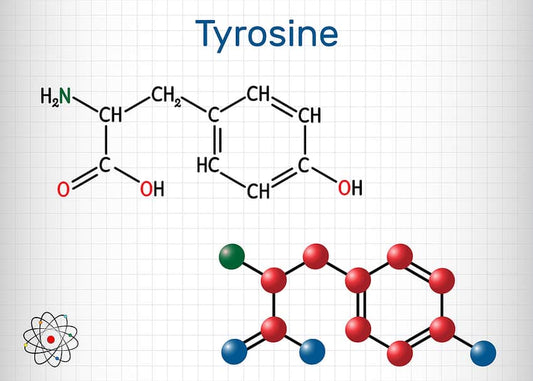When it comes to losing weight, it can be a never-ending battle. You’re eating well, you’re exercising daily, and it seems like you’re sleeping enough, yet for some reason, the weight is just holding on for dear life.
The thing is, sometimes it’s not all about those key lifestyle factors. For some people, hormone levels play a more prominent role than everything else, which means if you want to drop the excess weight, getting your hormones on track is top priority.
And that’s where tyrosine enters the picture.
L-tyrosine is an important precursor for the synthesis of compounds like epinephrine, norepinephrine, and dopamine, which are chemicals your body produces that regulate things like thyroid function, energy, stress, and mood. Because of these roles, it’s why some people claim that tyrosine can speed up metabolism.
In lieu of that, we’re diving into the research to determine whether the claims are true: Can L-tyrosine support weight loss?
What Is L-Tyrosine?
There are 20 amino acids that exist to form functional proteins. Of those 20 amino acids, 11 are non-essential, and 9 are essential. L-tyrosine is one of the non-essential amino acids that can be synthesized de novo from its precursor amino acid, phenylalanine, but may become conditionally essential under certain circumstances.
L-tyrosine is a precursor molecule to some of the most important neurotransmitters in the body, specifically those relating to the stress response—the catecholamines. That is, adrenaline, noradrenaline, and dopamine.
Studies suggest that changes in the availability of L-tyrosine to the brain can affect the synthesis of both dopamine and norepinephrine 1. And because stress essentially depletes the brain of these important chemicals, supplementing with L-tyrosine to counteract that decline becomes important.
While L-tyrosine doesn’t necessarily increase the release of the catecholamines in non-stressful situations (i.e. neuron firing isn’t increased), what it does do is enhance the release of these compounds when neurons are firing at a rapid pace (i.e. when you’re stressed).
It does this through conversion to a compound called L-DOPA, which is then converted into the neurotransmitters collectively referred to as the catecholamines.
These molecules all play critical roles in the stress response, but are also involved in several areas of cognitive function, including attention, memory, and emotion 2.
The Benefits Of Supplementing L-Tyrosine
- Protects against stress: Tyrosine serves as a precursor for the biosynthesis of neurotransmitters, specifically the “feel good” hormones, which may play a role in mitigating the negative effects of stress and supporting a balanced mood. It has a direct impact on levels of dopamine, which is the neurotransmitter that regulates the reward and pleasure centers of the brain, in addition to the adrenals that are heavily involved in the stress response. However, because stress depletes levels of catecholamines, tyrosine supplementation can mitigate the effects of stress on hormone and neurotransmitter depletion, thereby protecting the body against the effects of stress 3, 4.
- Manages mood: Because of its role in supporting neurotransmitter and hormone production, some studies suggest that tyrosine may support mood and help the body better cope with stress.
- Boosts energy and mental performance: One of the most notable benefits of tyrosine is in its ability to support cognitive performance; it’s been suggested to enhance focus and performance, as well as boost energy. During high-stress situation, tyrosine may help reduce mental fatigue and support cognitive functions, including memory. It’s also suggested to possess stimulant properties, which may be beneficial for improving learning and alertness, while reducing brain fog 5.
- Supports thyroid health and metabolism: This one is a biggie where weight loss is concerned and is the link between the potential for tyrosine to support weight management and body composition. The thyroid is the master metabolic regulator, and proper function of the gland is key for regulating caloric expenditure and weight 6. Tyrosine is required to synthesize thyroid hormones, specifically thyroxine (T4), which is the main hormone secreted by the thyroid gland. An under-functioning thyroid, also called hypothyroidism, means the thyroid doesn’t produce enough thyroid hormones and leads to symptoms like lethargy, weight gain, hair loss, dry skin, forgetfulness, constipation, and depression 7.
- May support weight loss: Where weight loss is concerned, tyrosine supplementation doesn’t have much support when used alone. However, some research suggests that when combined with other fat-burning ingredients—caffeine, green tea extract, or cayenne pepper—tyrosine may help with weight loss. A 2007 study looked at body fat loss through stimulation of thermogenesis by bioactive food ingredients and found that when used with capsaicin, catechins, and caffeine, tyrosine may stimulate the sympathetic nervous system to promote satiety, lipolysis, and thermogenesis 8.
Does L-Tyrosine Work For Weight Loss?
You’ll be hard-pressed to find studies supporting tyrosine for weight loss, but there is some research that could support a link. There are two main ways in which tyrosine may support weight loss:
1. Mitigating Stress To Prevent Weight Gain
Stress hits nearly every system in your body, but if you’ve ever experienced chronic stress, you’re probably aware that it can lead to weight gain, not only by increasing cortisol and insulin (both fat shortage hormones), but also by increasing appetite; we all get the urge to eat when we’re stressed because it’s comforting.
The thing with stress is that increased section of cortisol that comes along with activation of the HPA axis during the stress response signals to the body to down-regulate unnecessary processes like digestion, and up-regulate “essential” processes.
Studies show that stress and glucocorticoids act to control both food intake and energy expenditure, and glucocorticoids are known to increase the consumption of foods that are high in fat and sugar, resulting in the potential for weight gain 9.
Stress causes an increase in catecholamine activity, as well as depletion of catecholamine stores, which ultimately reduces responses to stress 10. Increasing catecholamine activity by administering the precursor amino acid, tyrosine, may increase responsiveness to stress and help the body cope more effectively, thereby reducing cortisol levels.
While there isn’t solid scientific evidence to support this, getting stress levels under control may help to mitigate the negative effects of stress on body weight.
2. Regulating The Thyroid
As we said, the thyroid is the master controller of your metabolism, and a malfunctioning thyroid gland can lead to hypothyroidism, in which weight gain is a cardinal symptom.
Activation of thyroxine (T4), to the active form, triiodothyronine (T3), by 5′-deiodinase type 2 (D2) is a key mechanism of thyroid regulation of metabolism; D2 is expressed in the hypothalamus, as well as white and brown adipose tissue, and skeletal muscle, and is required for adaptive thermogenesis 11.
The thyroid is largely controlled by two hormones called thyrotropin-releasing hormone (TRH) and thyroid-stimulating hormone (TSH), and in addition to regulation by thyroid hormone feedback, it is also modulated by nutritional signals, such as leptin, along with peptides regulating appetite.
Long story short, thyroid hormones are responsible for regulating metabolism primarily through actions in the brain, white fat, brown fat, skeletal muscle, liver, and pancreas, which means that adequate levels of thyroid hormone are critical for regulating energy expenditure, appetite, and weight 11.
So, having enough of the precursor amino acid to form thyroid hormones becomes an essential piece of the puzzle where weight loss is concerned.
We also have one other mechanism that may link tyrosine supplementation to weight loss.
Studies show that supplementation with tyrosine can enhance noradrenaline synthesis, and when used in combination with other sympathomimetics, may reduce food intake, thereby preventing weight gain 12.
They may do this by enhancing the activity of the sympathetic nervous system and increasing the release of noradrenaline (NA), which suppresses appetite, enhances satiety, and increases energy expenditure, covered in part by increased fat oxidation.
But the reason why noradrenaline synthesis increases may be due to an increase in substrate supply of the precursor, tyrosine. Tyrosine may also potentiate the effect of CAP, and CAP is known to activate sympathetic nerves by stimulating NA release 12.
Studies have looked at the effect of CAP, green tea extract, tyrosine, caffeine, and calcium on weight loss and found that a 7-day supplementation protocol could significantly decrease 24-hour energy balance by up to 200 kJ/day 13.
Final Thoughts
While tyrosine likely isn’t going to help you drop weight like some other weight management supplements, it could offer some powerful indirect effects on hormone and neurotransmitter levels that could lead to weight loss.
But the thing with weight loss is that it’s not only physical—the mental aspect plays a massive role, and in order to successfully lose weight and keep it off, you need to be in the right mental frame.
For times like that, Performance Lab Mind should be your go-to. It’s the most effective nootropic supplement designed to rev your mental engine, and improve focus, attention, and motivation.

When you can get into the mental zone required to blast through your workouts and maintain your diet, losing weight becomes a lot less challenging. Taken daily, Mind can support you through even the toughest days and keep you on track to successful and permanent weight loss.
References
- SN Young. L-tyrosine to alleviate the effects of stress?J Psychiatry Neurosci. 2007;32(3):224.
- SC Daubner, T Le, S Wang. Tyrosine hydroxylase and regulation of dopamine synthesis.Arch Biochem Biophys. 2011;508(1):1-12.
- SN Young. L-tyrosine to alleviate the effects of stress?J Psychiatry Neurosci. 2007;32(3):224.
- A Hase, SE Jung, M aan het Rot. Behavioral and cognitive effects of tyrosine intake in healthy human adults. Pharmacol Biochem Behav. 2015;133:1-6.
- LS Colzato, BJ Jongkees, R Sellaro, B Working memory reloaded: tyrosine repletes updating in the N-back task. Front Behav Neurosci. 2013;7:200.
- org (Internet). Cologne, Germany: Institute for Quality and Efficiency in Health Care (IQWiG); 2006-. How does the thyroid gland work? 2010 Nov 17 (Updated 2018 Apr 19). Available from: https://www.ncbi.nlm.nih.gov/books/NBK279388/
- WJ Treatment of hypothyroidism (published correction appears in Am Fam Physician 2002 Jun 15;65(12):2438).Am Fam Physician. 2001;64(10):1717-1724.
- A Belza, E Frandsen, J Kondrup. Body fat loss achieved by stimulation of thermogenesis by a combination of bioactive food ingredients: a placebo-controlled, double-blind 8-week intervention in obese subjects.Int J Obes (Lond). 2007;31(1):121-130.
- SD Hewagalamulage, TK Lee, IJ Clarke, BA Henry. Stress, cortisol, and obesity: a role for cortisol responsiveness in identifying individuals prone to obesity. Domest Anim Endocrinol. 2016;56 Suppl:S112-S120.
- HR Lieberman, LA Thompson, CM Caruso, et al. The catecholamine neurotransmitter precursor tyrosine increases anger during exposure to severe psychological stress.Psychopharmacology (Berl). 2015;232(5):943-951.
- R Mullur, YY Liu, GA Brent. Thyroid hormone regulation of metabolism.Physiol Rev. 2014;94(2):355-382.
- A Belza, E Frandsen, J Kondrup. Body fat loss achieved by stimulation of thermogenesis by a combination of bioactive food ingredients: a placebo-controlled, double-blind 8-week intervention in obese subjects.Int J Obes (Lond). 2007;31(1):121-130.
- A Belza, AB Jessen. Bioactive food stimulants of sympathetic activity: effect on 24-h energy expenditure and fat oxidation. Eur J Clin Nutr 2005; 59: 733–741.














